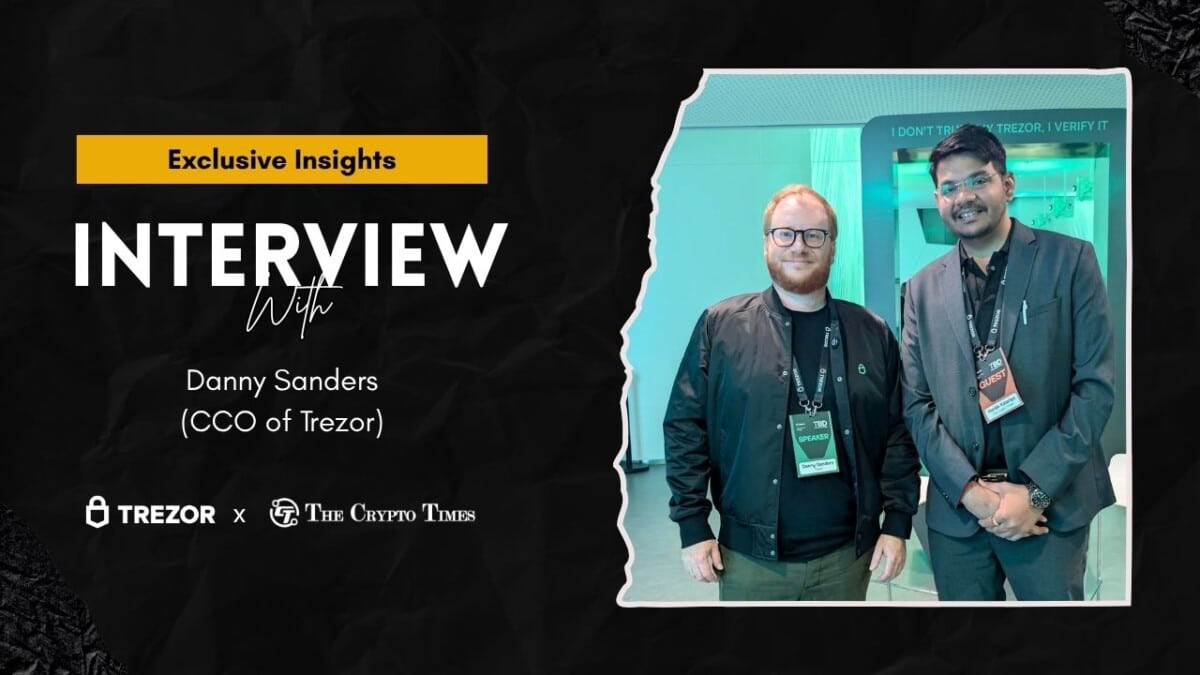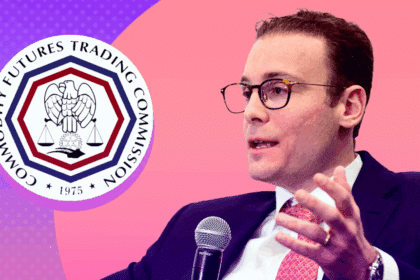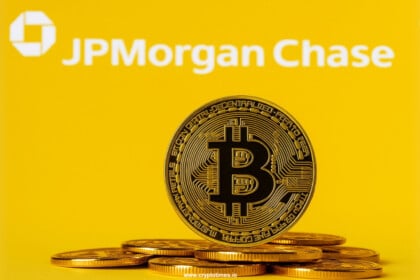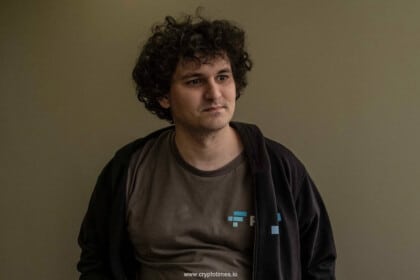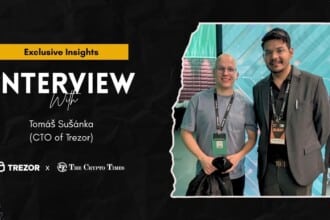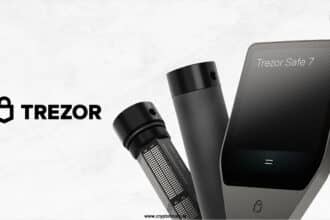In the heart of Prague, Trezor took a big step forward by hosting its first independent product launch — a change from its usual habit of revealing new devices at large crypto conferences. This wasn’t just another event; it was a sign that the company wants to take full control of its story and direction in the crowded hardware wallet market.
In an exclusive conversation with The Crypto Times founder and CEO Hardik Katariya, Danny Sanders, Trezor’s Chief Commercial Officer (CCO), spoke about the company’s focus on innovation, why self-custody matters more than ever, and how the rise of AI and privacy concerns are shaping the future of crypto ownership.
The meaning behind Trezor’s first standalone launch
For Trezor, hosting its own event was more than a marketing decision — it was about creating a space that truly embodied its values. “This is the first time we do our own launch events,” said Sanders. “We used to launch products at conferences, but we don’t control the environment to the fullest.”
That control mattered because the company was unveiling what Sanders called “our biggest launch ever.” The product, Trezor Safe 7, represents years of research and development aimed at redefining the experience of secure crypto storage. The event’s success, he added, came down to the team’s commitment: “I’m super proud of the team doing this huge hard work to make all of this happen.”
Why physical connection still matters
In an era dominated by digital interactions and artificial intelligence, Sanders believes physical connection is becoming more valuable. “In a new world where everything is like AI and stuff, I think physical events are more and more important,” he said. “We need to connect.”
The event brought together both long-time supporters and newcomers from around the world, including attendees from Japan, Brazil, and India. Sanders said this reinforced Trezor’s sense of community: “People really believe in Trezor. It’s not just that they are invited. They trust the company.”
Understanding the sales cycle in crypto
When asked about Trezor’s record-breaking sales last year, Sanders acknowledged how closely the hardware wallet market follows Bitcoin’s price movements. “One of the biggest drivers for hardware wallets is retail FOMO and hype,” he said. The company experienced major surges when Bitcoin approached new highs, though he noted the pattern is evolving.
“It’s not the same bull market effect as before,” Sanders explained. “Now, it seems to be more spread out, but the baseline is higher and higher.” This trend, he said, signals maturity — a shift from short-lived spikes to sustained interest.
Balancing reliability and innovation
Trezor’s reputation was built on reliability — a principle that still guides its product evolution. Sanders highlighted that even the Trezor One, the company’s first device, remains secure and functional today. However, innovation remains key to improving usability and user experience.
“Our devices are all safe — Safe 3, Safe 5, Safe 7,” he said. “We have some new technology in here, but everybody can be reassured that it’s top-notch security.”
One of the standout features of the Safe 7 is its quantum-ready design, part of Trezor’s long-term preparation for future threats. “It’s not just about hardware but also software,” Sanders noted. The company already plans its next generation of devices years in advance — Safe 7 itself took nearly five years to bring to market.
A strategy for global growth
While Trezor’s core audience remains in the U.S. and Europe, the company is eyeing rapid expansion into new territories. “We are now aggressively looking into new markets,” Sanders revealed. Countries like Brazil, Japan, and India are at the forefront of this strategy. “India is one of those countries that’s fun. We got some licensing there to start selling,” he added.
These markets are not only growing fast but also reflect strong interest in crypto ownership. Over the next five years, Trezor plans to deepen its presence in both EMEA and APAC regions through local partnerships and region-specific strategies.
Privacy as a core feature
Unlike many tech companies that rely on user data, Trezor’s philosophy centers on privacy by design. Sanders explained this simply: “The best data is no data.”
The company’s analytics are completely anonymized and temporary — a trade-off that makes marketing harder but builds user trust. “It’s also a feature, not a bug,” Sanders said. This strict data policy reflects Trezor’s ethos: privacy isn’t an add-on; it’s fundamental.
Regulatory clarity and self-custody
On regulation, Sanders took a clear stance. “We’re not like exchanges looking for clarity,” he said. “We are kind of on the opposite side here — self-custodial.” His main concern is ensuring that individuals can continue to legally hold their own keys. “That nobody creates regulation saying you’re no longer allowed to hold your own keys — this is our fear.”
Currently, he sees no major threats in the U.S. or Europe, where self-custody is increasingly viewed as a legitimate and necessary model.
In an ecosystem where trust is fragile, Trezor relies on transparency. “We kind of like to say, don’t trust us — look at the code, verify for yourself,” Sanders said, emphasizing the company’s open-source philosophy. Through its sister company, Tropic Square, Trezor also contributes to open hardware solutions that make trust measurable.
Education over hype
Selling security in a world driven by convenience isn’t easy. Sanders acknowledged that “it’s not an easy message always,” but believes education is key. Campaigns like “Own Your Money” are designed to connect emotionally, reminding people of real-world examples where individuals lost access to their wealth.
Events like the FTX collapse proved this point. “When FTX happened, that was our best sales week ever,” Sanders recalled. For some, such events drive people away from crypto; for others, they reinforce why self-custody matters.
Staying true to Bitcoin
Trezor’s financial independence has allowed it to stay true to its principles. The company holds its treasury in Bitcoin and refuses to issue its own token. “We will not make a token. That would not be us,” Sanders said. “We are a profitable company — the proof that you don’t need to do it.”
His personal stance aligns with that vision: “I truly believe in Bitcoin. It’s the most decentralized hard money.”
The road ahead
From the Safe 7’s launch to its ongoing global expansion, Trezor is navigating a complex, evolving crypto landscape with steady principles — self-custody, privacy, and trust. For Sanders, the mission remains straightforward: help people truly own what’s theirs.
“You can start with a hardware wallet,” he advised newcomers. “It’s not that hard. It feels different to truly own your crypto.”
As crypto matures and AI reshapes how people interact online, Trezor’s path forward is clear — building tools that protect both freedom and privacy, one wallet at a time.
Also Read: Trezor Uncovered: CTO Tomáš Sušánka on the Future of Crypto Security


